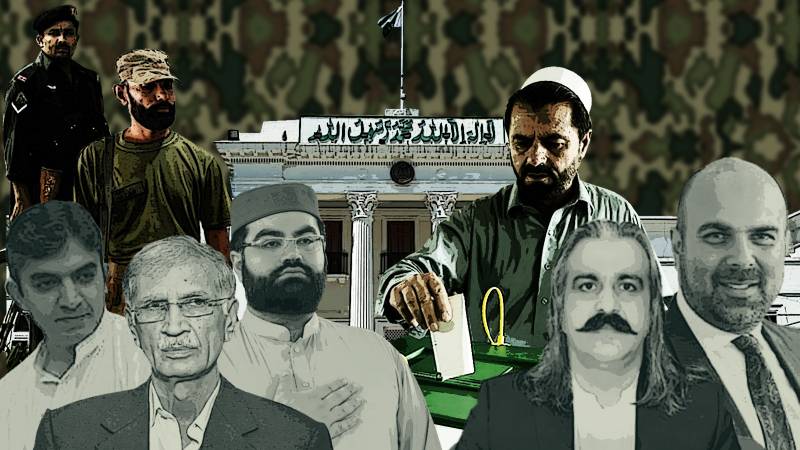
General elections were held on February 8, 2024. Instead of resolving existing ones, they have created even more controversies, to put it mildly. The general perception of the expected results has been proven wrong by the announced results.
There are many interpretations and explanations for this outcome, the most popular of which seems to be: 'the people have voted against the establishment', and people have rejected traditional politics. Some do so without giving credit to the Pakistan Tehreek-e-Insaf (PTI), while the PTI claims credit for standing up to the establishment. Is that so? Has the establishment really lost? Will it result in more democracy? At the same time, there are widespread complaints of rigging from almost all sides, including the PTI. The most vocal dissent is seen on the streets of Balochistan. A very important but less discussed side of these results is the total failure of the Baloch and Pashtun nationalist parties.
Unlike Balochistan, Khyber Pakhtunkhwa has not demonstrated much popular and on-the-street opposition to the results, save for the PTI protesting in select areas against rigging — rather stealing — the outcome in two constituencies of Peshawar.
Mohsin Dawar of the National Democratic Movement (NDM) was injured while some of his party men were killed by live shooting from personnel of law enforcement agencies (LEAs) while protesting in front of the Returning Officer's (RO) office in Miran Shah. Aimal Wali Khan of the Awami National Party (ANP) condemned the election results in a strongly worded, anti-establishment press talk and announced two public protest meetings for later this month. Maulana Fazlur Rehman's Jamiat Ulema-e-Islam Fazl (JUI-F) has also rejected the results, condemning the establishment. Maulana Rehman has claimed that his party's stand on relations with the Afghan Taliban, as well as support for the Palestinian group Hamas, has been a turning point for his party with the establishment.
The nomination of Ali Amin Gandapur for the office of Khyber Pakhtunkhwa's chief minister lends credence to the perception of the managed character of the February 8 elections and its results
The different explanations presented for the election results are
- The popularity of Imran Khan and the resolve of his supporters,
- The anti-establishment sentiments of people,
- a. Lower-level corruption of government servants responsible for elections,
b. Not much talked about, but the support of Imran Khan at mid to lower level of state employees who rigged the results in favour of PTI despite orders to the contrary, - Establishment planned and managed results to get these results aimed at a divided parliament and a weak government, thus easily maneuverable,
b. Keep the Pashtun nationalists out, aiming to govern Khyber Pakhtunkhwa like Balochistan and Gilgit Baltistan
Most of us, however, are analysing the results according to our wishes and are seeing what we want to see. This author does not claim to be an exception to this phenomenon. Not just PTI supporters but even its strongest critics see these results as anti-establishment. If the scope of this write-up is limited to Khyber Pakhtunkhwa, even then, many do not appear happy with these results and view it in their own biases. Some seek to justify the failure of the ANP in elections, for right or wrong reasons, simply because they are opposed to the ANP. The same goes for JUI-F's failure. The result is further fragmentation and polarisation of politics and society beyond political or ideological lines.
Gandapur is hailed as a strongman and a strong loyalist to Imran Khan. What most analysts forget is that he is an apolitical person, with not much in the way of political perspectives to the left or right and is a typical feudal
The nomination of Ali Amin Gandapur for the office of Khyber Pakhtunkhwa's chief minister lends credence to the perception of the managed character of the February 8 elections and its results. If one looks at it in the context of the PTI denying provincial assembly tickets to other, stronger candidates of the party while losing the likes of Taimur Jhagra and Kamran Bangash to relatively weak and unknown candidates, thus paving the way for Gandapur to emerge as the only choice, it adds credence to allegations of careful management. Gandapur, who is wanted by the law as the main accused in the May 9 cases, is not only allowed to stay out of jail but hosted a visit from the Khyber Pakhtunkhwa's caretaker chief minister on Thursday.
Gandapur is hailed as a strongman and a strong loyalist to Imran Khan. What most analysts forget is that he is an apolitical person, with not much in the way of political perspectives to the left or right and is a typical feudal. We know the state is experienced in using/maneuvering such individuals. Coupled with the news (yet to be confirmed) of PPP nominating Sarfraz Bugti for the slot of chief minister in Balochistan, the view that Khyber Pakhtunkhwa will probably be managed like Balochistan is further strengthened.
Both Gandapur and Bugti are known for their highhandedness and ruthlessness. Whether managed or not, unlike popular belief, the state authorities will not be unhappy with Gandapur as the chief minister.
If there has been insubordination — as a result of corruption or political choice — or the results were carefully managed, or they really reflect the free choice exercised by the people, the expected governments in the centre and provinces could find their desired political stability elusive. The situation is such that people are now betting on the duration of the governments which will be formed.
If anything, these elections have only multiplied the existing uncertainty in the country. Unlike popular belief, the coming days will see greater intervention and control from the establishment with no semblance of civilian supremacy.

